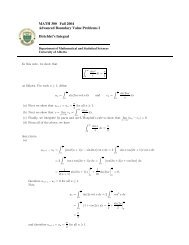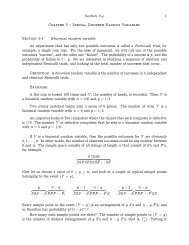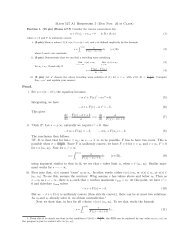Math 411: Honours Complex Variables - University of Alberta
Math 411: Honours Complex Variables - University of Alberta
Math 411: Honours Complex Variables - University of Alberta
Create successful ePaper yourself
Turn your PDF publications into a flip-book with our unique Google optimized e-Paper software.
That is, F ′ (z) = f(z).<br />
Theorem 4.1 (Antiderivative Theorem). Let D ⊂ C be open and connected and let<br />
f: D → C be continuous. Then the following are equivalent:<br />
(i) f has an antiderivative;<br />
(ii) �<br />
f(ζ)dζ = 0 for any closed, piecewise smooth curve γ in D;<br />
γ<br />
(iii) for any piecewise smooth curve γ in D, the value <strong>of</strong> �<br />
f depends only on the<br />
γ<br />
inital point and the endpoint <strong>of</strong> γ.<br />
Pro<strong>of</strong>. (i) =⇒ (ii) is Proposition 4.1.<br />
(ii) =⇒ (iii): Let γ,Γ: [a,b] → D be piecewise smooth curves with γ(a) = Γ(a)<br />
and γ(b) = Γ(b). Then γ ⊕Γ− is a closed, piecewise smooth curve, so that<br />
� � � � �<br />
0 = f = f + f = f − f.<br />
γ⊕Γ −<br />
γ<br />
(iii) =⇒ (i): Fix z0 ∈ D. For each z ∈ D, choose a piecewise smooth curve<br />
γz : [a,b] → D with γz(a) = z0 and γz(b) = z and let<br />
�<br />
F: D → C, z ↦→ f(ζ)dζ.<br />
For each z ∈ D, choose δ > 0 such that Bδ(z) ⊂ D and note for w ∈ Bδ(z) that<br />
�<br />
F(w) = f(ζ)dζ<br />
γw �<br />
= f(ζ)dζ by (iii)<br />
γz⊕[z,w]<br />
� �<br />
= f(ζ)dζ + f(ζ)dζ<br />
γz<br />
�<br />
[z,w]<br />
= F(z)+ f(ζ)dζ.<br />
Γ −<br />
[z,w]<br />
Lemma 4.1 then implies that F is an antiderivative for f.<br />
Fromnowon, weshall use theword curveasshorthandforpiecewise smooth curve.<br />
γz<br />
γ<br />
Γ<br />
27







